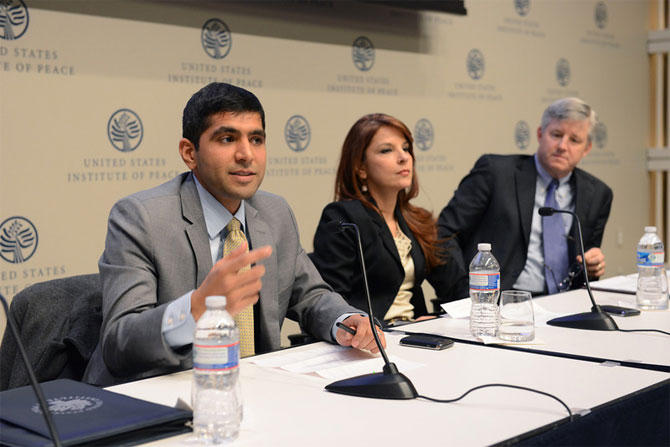The Future of the Pakistan-U.S. Relationship Between Now and 2014
USIP hosted a panel discussion on the near to medium term future of the Pakistan-U.S. relationship. Panelists examined whether the U.S. outlook towards Pakistan is likely to change in President Obama’s second term and if so, how? What will be the pros and cons of the likely policy shift? What are the expectations from both sides going forward?
Read the event coverage, Panel at Peace Institute Assesses U.S.-Pakistan Relations

As we approach the 2014 transition in Afghanistan, the role of regional neighbors in contributing to and/or undermining transition processes becomes more important than ever before. Pakistan’s outlook regarding the “end game” in Afghanistan, and the dynamics of the Pakistan-U.S. relationship, remain crucial in this regard. The steadily deteriorating Pakistan-U.S. relationship during the past two years has been very detrimental to the collaboration needed for both sides to come up with a more convergent vision for the “end game” in Afghanistan. The state of the Pakistan-U.S. relationship over the next two years will be a critical factor in determining Pakistan’s role in the 2014 transition in Afghanistan. Both sides must improve ties despite a deep lack of trust and the negative political and public opinion they face in each other’s capitals.
USIP hosted a panel discussion on the near to medium term future of the Pakistan-U.S. relationship. Panelists examined whether the U.S. outlook towards Pakistan is likely to change in President Obama’s second term and if so, how? What will be the pros and cons of the likely policy shift? What are the expectations from both sides going forward?
Panelists
- Sajit Gandhi, Panelist, Democratic Professional Staff Member, House Committee on Foreign Affairs
- Simbal Khan, Panelist, Pakistan Scholar, Asia Program, The Woodrow Wilson Center
- Michael Phelan, Panelist, Senior Professional Staff Member, Senate Committee on Foreign Relations
- Moeed Yusuf, Moderator, South Asia Advisor, United States Institute of Peace
Explore Further
Read the summary, "Panel at Peace Institute Assesses U.S.-Pakistan Relations"



